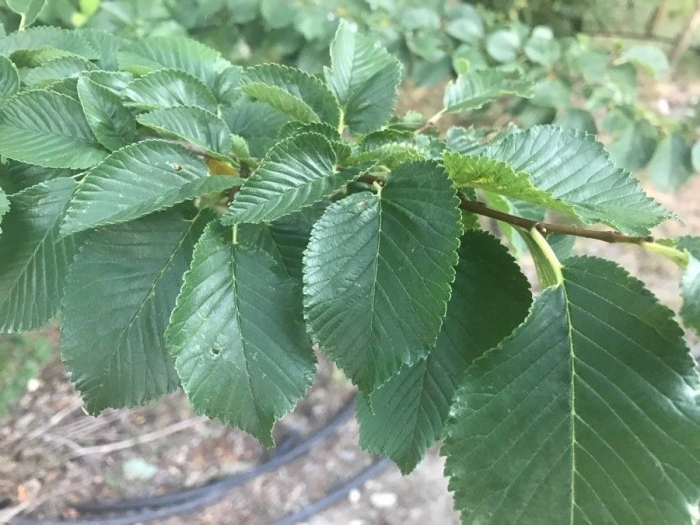European Field Elm
(Ulmus minor)
European Field Elm (Ulmus minor)
/
/

Fco. José Rodríguez
CC BY-SA 4.0
Image By:
Fco. José Rodríguez
Recorded By:
Copyright:
CC BY-SA 4.0
Copyright Notice:
Photo by: Fco. José Rodríguez | License Type: CC BY-SA 4.0 | License URL: https://creativecommons.org/licenses/by-sa/4.0/ | Attribution: Fco. José Rodríguez (cc-by-sa) | Rights Holder: Fco. José Rodríguez | Publisher: PlantNet | Date Created: 2019-07-02T19:27:34.042Z | Title: Ulmus minor Mill.: leaf | Notes: |

























































Estimated Native Range
Summary
Ulmus minor, commonly known as European Field Elm, is a deciduous or semi-deciduous tree native to a variety of habitats including deciduous forests, floodplains, and grasslands across Europe, West Asia, and parts of North Africa and the Middle East. It can grow up to 30 meters (98 feet) tall and is characterized by a rounded crown and a trunk with deeply furrowed bark. The European Field Elm blooms in early spring before the leaves emerge, producing small, inconspicuous flowers that are green with red stigmas. The flowers give way to winged seeds known as samaras.
The European Field Elm was once a popular choice for urban and rural plantings due to its tolerance of harsh conditions and its ability to form dense hedges or screens. However, its popularity has declined due to its high susceptibility to Dutch elm disease, which has devastated populations across its range. In cultivation, it requires full sun to part shade and can adapt to a range of soil types, provided they offer adequate drainage. While it is adaptable to various moisture levels, it thrives with high water availability. Despite these attributes, caution is advised when planting Ulmus minor outside its native range due to its potential invasiveness, particularly in the United States.CC BY-SA 4.0
The European Field Elm was once a popular choice for urban and rural plantings due to its tolerance of harsh conditions and its ability to form dense hedges or screens. However, its popularity has declined due to its high susceptibility to Dutch elm disease, which has devastated populations across its range. In cultivation, it requires full sun to part shade and can adapt to a range of soil types, provided they offer adequate drainage. While it is adaptable to various moisture levels, it thrives with high water availability. Despite these attributes, caution is advised when planting Ulmus minor outside its native range due to its potential invasiveness, particularly in the United States.CC BY-SA 4.0
Plant Description
- Plant Type: Tree
- Height: 30-80 feet
- Width: 30-50 feet
- Growth Rate: Moderate
- Flower Color: N/A
- Flowering Season: Spring
- Leaf Retention: Deciduous
Growth Requirements
- Sun: Full Sun, Part Shade
- Water: High
- Drainage: Slow, Medium, Fast
Common Uses
Bank Stabilization, Bee Garden, Bird Garden, Butterfly Garden, Drought Tolerant, Hedges, Salt Tolerant
Natural Habitat
Deciduous forests, floodplains, and grasslands
Other Names
Common Names: Small-Leaved Elm, Småbladet Elm, Feldulme, Orme Champêtre, Ormeau, Lundalm, Gladde Iep, Rödalm
Scientific Names: , Ulmus minor, Ulmus nitens, Ulmus corylifolia, Ulmus minor subsp. carpinifolia, Ulmus vulgaris, Ulmus campestris var. minor, Ulmus minor var. minor, Ulmus carpinifolia f. sarniensis, Ulmus carpinifolia var. cornubiensis
GBIF Accepted Name: Ulmus minor Mill.